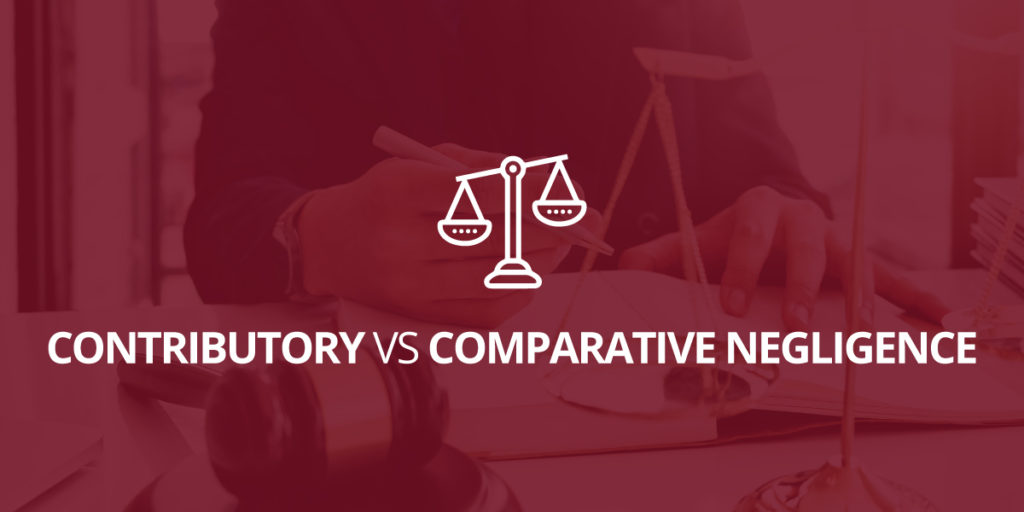Table of Contents
Toggle
An accident is not always caused by just one person’s carelessness or recklessness. Whether it is a car crash, slip, and fall, dangerous property accident, or other incident, it may arise because two or more people were careless. Each person contributed to the incident in some way.
When someone pursues compensation from another at-fault party, but more than one person may have been responsible, the insurer or court has to look at how liable each party is for the accident. The insurer or court will assign each party a percentage of fault out of 100%. Whether the state follows contributory negligence or pure or modified comparative negligence rule then determines who will receive compensation for their injuries and how much.
Contributory Negligence
When an accident victim attempts to recover compensation through an insurance claim or personal injury lawsuit, but an insurer or court finds they are in any way at fault, they will be denied compensation entirely. When an accident victim is at least 1% at fault, then they are barred from recovering an insurance settlement or court award. The insurer will deny the claim and the judge or jury will not award any compensation.
Contributory negligence is often considered a harsh rule. Only Alabama, the District of Columbia, Maryland, North Carolina, and Virginia follow this rule.
Pure Comparative Negligence
Under a pure comparative negligence rule, an accident victim can recover compensation no matter their percentage of fault. An insurer or court could assign the claimant a percentage greater than the other party. The claimant can then receive compensation, but it will be reduced by their percentage of fault. For example, if the insurer or court finds the victim’s claim was worth $100,000, but they were 75% at fault, then the claimant can only receive $25,000.
Alaska, Arizona, California, Florida, Kentucky, Louisiana, Mississippi, Missouri, New Mexico, New York, Rhode Island, and Washington follow this rule.
Modified Comparative Negligence
The modified comparative negligence is the most common rule, although states handle it slightly differently.
An accident victim can recover compensation if they are less than half at fault. In other words, the accident victim must be less responsible for the incident than the other party or parties involved. If the claimant is 50% or 51% or more at fault, depending on the state, then they cannot recover any compensation.
Colorado, Georgia, Idaho, Kansas, Maine, Nebraska, North Dakota, Tennessee, and Utah follow the 50% rule. Accident victims must be assigned 49% or less responsibility to recover compensation.
Connecticut, Delaware, Hawaii, Illinois, Indiana, Iowa, Massachusetts, Michigan, Minnesota, Montana, Nevada, New Hampshire, New Jersey, Ohio, Oklahoma, Oregon, Pennsylvania, South Carolina, Texas, Vermont, West Virginia, Wisconsin, and Wyoming use the 51% bar. Claimants can be 50% or less at fault and recover a settlement or court award.
An injury victim who is somewhat at fault may receive compensation, but the settlement or court ruling will be reduced by their percentage of fault. Because of this, it is important for accident victims to work with experienced personal injury attorneys. A lawyer can not only prove the maximum value of the victim’s damages, but also minimize their percentage of responsibility.
Are You Being Partly Blamed for an Accident?
If you were involved in an accident in Denver or the surrounding area, and the other party claims you were also to blame, it is important to work with an experienced Denver personal injury attorney. Even if this defense has not come up yet, if you fear you are partly to blame, you should call a lawyer right away.
Your lawyer will thoroughly investigate the incident, analyze all of the evidence, and build a strong defense against a comparative negligence claim. Jennifer Donaldson has years of experience handling personal injury claims involving comparative negligence defenses. She crafts case-specific strategies to combat these allegations and minimize a claimant’s percentage of responsibility in order to pursue full and fair just compensation for her client’s injuries.
To schedule a consultation with Donaldson Law, LLC , submit your information through the online form or call 303-458-5000.

















